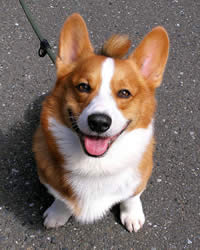Pembroke Welsh Corgi Breed Information
 |
| ||||||||||||||||||||||||||||||||||||||||||||||||||||||||||||||||||||||||||||||||
Just The Facts
| Do you own this Dog breed?Please tell us about it in the form at the bottom of this page. |
General Description
Regal, friendly and adventurous, the Pembroke Welsh Corgi is a canine fit for a queen. These herding dogs are affectionate, active and mobile, making them ideal dogs for even the newest dog owners.
Standing less than a foot off the ground, Corgis hold their own as a loyal guard dog, with a powerful bark and a willingness to act. The Corgi is a dignified breed, but happy and willing to learn and perform at your leisure. They are also well suited for a variety of climates, though not well suited for many flights of stairs.
Origin and History
Though these Corgis were bred for their strong herding instincts, they gained the most notoriety for becoming the prized breed of Queen Elizabeth II. There are photos and accounts of dozens of these dogs roaming the yards of Buckingham Palace.
Their origins remain fairly unclear, but they date back as far as the 11th century and are strongly believed to be related to the Cardigan Welsh Corgi, though both of these dogs were bred separately.
Pembroke Welsh Corgi Temperament
For a loyal and friendly companion, this breed is especially proud and outgoing. They display little fear from strangers or other dogs, and they are willing to take on whatever challenges may come their way.
Their loyalty makes them excellent guard dogs, though their protective nature makes them weary of strangers. Still, they get along with both people and animals provided they are gentle. Corgis are also prone to barking and chasing cats away from their property.
Care, Grooming, Diet & Exercise
Living Environment – Pembroke Welsh Corgis are suitable for most any living environment. However, it is best if they are kept in a home with older children that will be gentle with this fragile canine.
Grooming – Pembroke Welsh Corgis shed throughout the year. Brushing once a week is best for most dog owners, though during heavy shedding periods every day may be necessary. Ear cleaning and nail clipping is helpful. Corgis are not prone to heavy odors.
Diet & Exercise – As with all herding dogs, long walks are important. The Pembroke is intelligent and active, which makes them prone to boredom behaviors when kept indoors for long periods of time. Provided they get their daily walk, they are actually quite docile apartment dwellers.
Corgis are fairly easy going with their diet; however, since obesity can lead to serious back strain it is a good idea to measure their food and watch their intake.
Health – The biggest health worry for the Pembroke Welsh Corgi is its elongated spine. Obesity, roughhousing and excessive stair climbing can all cause potentially serious back problems.
A disease known as degenerative myelopathy (a spinal cord disease) is also a risk, and can cause muscle weakness and breakdown. Canine hip dysplasia is also a serious risk. Several of the Corgi’s genetic diseases can be checked with DNA tests. Check with the breeder to make sure your puppy is not at risk.
Trainability
The Pembroke Welsh Corgi is one of the most intelligent dog breeds available, and can easily pick up new tricks. They enjoy pleasing their owners and find dog training to be exciting and fun. However, that excitement can wear off quickly, so daily training time should be limited to prevent boredom. Socialization is also important with other dogs as well as humans.
Do you own this dog breed?
Please tell us about your experience with a particular dog breed, and upload a picture if you have one!
Return from Pembroke Welsh Corgi Breed Information back to List of Dog Breeds page
Return to Dogs and Dog Advice home page